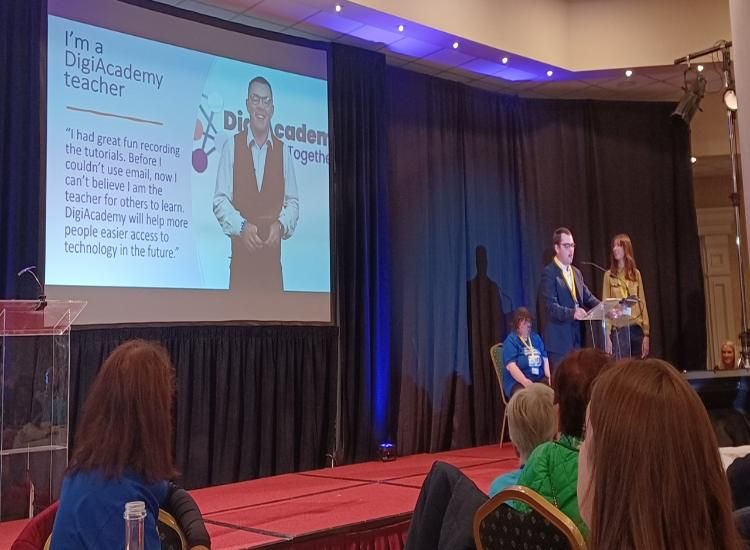Accessible digital skills education programme for adults with intellectual disability continues to grow
Posted on: 26 December 2022
Researchers from Trinity, who are spearheading an accessible digital skills education programme that will support better health and social inclusion outcomes for adults with intellectual disabilities, have international plans for 2023 – with a roadshow in the UK an early highlight.
At a time of year when many of us think about new resolutions, such as enhancing our health and wellbeing, the importance of the DIGI-ID PLUS programme couldn’t be clearer: approximately 200 million people globally have intellectual disabilities, and many of them are held back in life due to low access to digital skills learning opportunities.
Dr Esther Murphy, the programme’s Principal Investigator, is based in the Robotics and Innovation Lab inTrinity’s School of Engineering. She said:
“At the heart of the project is an authentic user-centred and user-led design process, which involves more than 400 people with accessibility needs and supporters across Europe and the UK. We also employ individuals with intellectual disabilities and accessibility needs who act as advisors, and their involvement is essential to ensure we respond to their needs.
“Together we are developing an accessible digital skills e-learning video platform to address the challenge of digital literacy and access. We hope that DigiAcademy will improve lives by empowering people to learn the digital skills to pursue the lives of their choice.”

Digi-ID PLUS Citizen Advisory Panel member James Delaney and Principal Investigator Dr Esther Murphy presenting at Brothers of Charity National Advocacy Conference.
As the new year looms fast on the horizon, the team is looking forward to taking the impact of DIGI-ID PLUS further and wider.
The programme brings together EU partners’ expertise in the fields of intellectual disability, social science, accessibility, healthcare technologies, public health from Ireland, France, Sweden, the Netherlands, Spain and Croatia. With multiple collaborators involved, including experts from across campus, the ADAPT Centre, Trinity Centre for People with Intellectual Disabilities and leading industry partner Microsoft, Dr Murphy says a co-design method will continue to drive the development of new innovative features focusing on adaptive learning and AI support.
Included within the Digi-ID PLUS team is also the Citizen Advisory Panel (CAP), which comprises 14 individuals with intellectual disabilities, hired as experts by experience and intentionally established to include a wide range of voices with diverse age, gender and digital competency to allow researchers to listen to their lived experiences and ensure their voices shape every key project decision.

Digi-ID PLUS activities in 2022: on the top photos of the co-creation activities within the collaborators’ intellectual disabilities services and training centres, underneath photos of activities with our Citizen Advisory Panel members and new teachers.
And that is just the beginning, with a recent €2.2 million EIT Health funding award helping to expand the scope of the project far and wide for three years from 2022.
The unique feature of DigiAcademy is that people with intellectual disabilities are the face and the voice of the programme. A member of the Citizen Advisory Panel and a DigiAcademy Microsoft Teams teacher Lia Gogarty said:
“I am very proud to be a new DigiAcademy teacher and I’m very excited to show others how to use technology. I’m so happy to help other people with intellectual disabilities and to inspire them.”
Dr Murphy added:
“We have just wrapped training three new teachers in Microsoft content, enjoyed another stellar event at Dream Space during the mid-term break, and completed a hybrid Digi event with one of our collaborating services. Our supporter side of the app is co-created and in its testing phase, which is especially exciting as now organisations have the potential to create their own accounts and, if learners choose, they can monitor their own progress.”
Disability support services have welcomed the DigiAcademy learner centred design and the inclusion of the app’s new supporter side.
Kieran Hayes from RehabCare said:
“I like that Digi-Academy is co-produced, that the supporter side of it came through listening to people and that the learners are in control. They can decide who joins up or who they're admitting as a supporter. It's very learner-centred that way, and it's quite empowering for supporters because you know you can get involved in the learning process”
To learn more about the DIGI-ID PLUS project, watch this project video.
